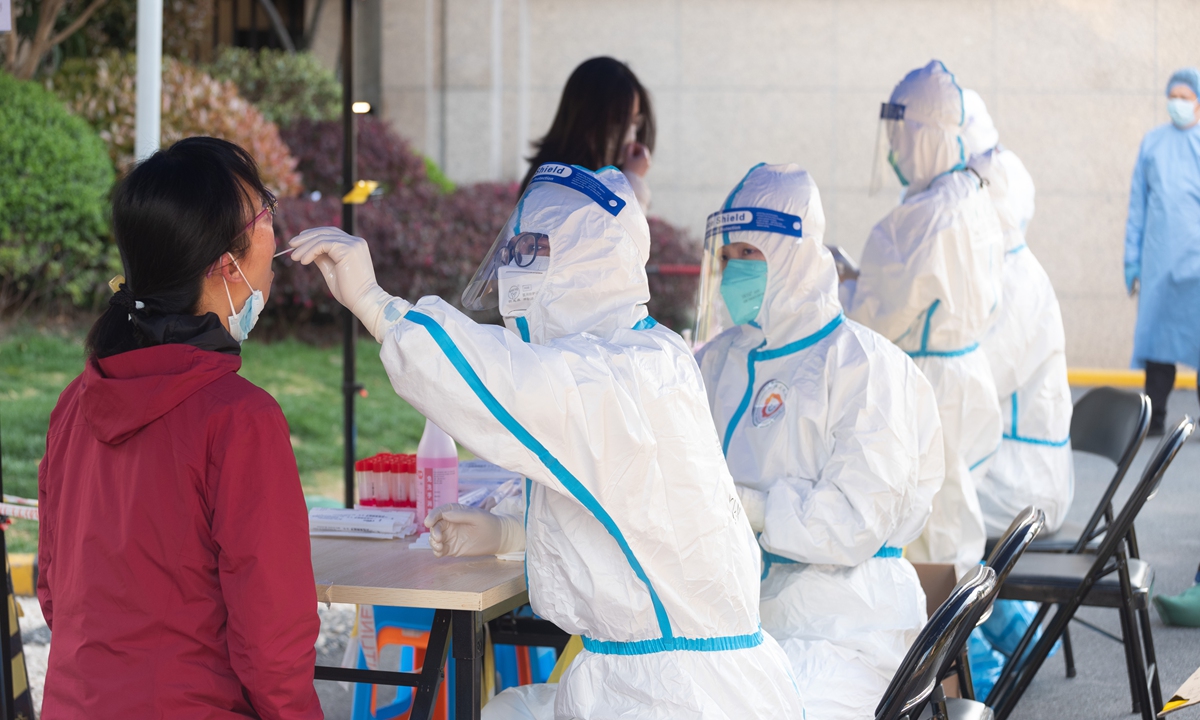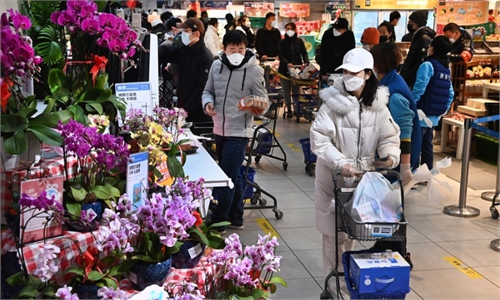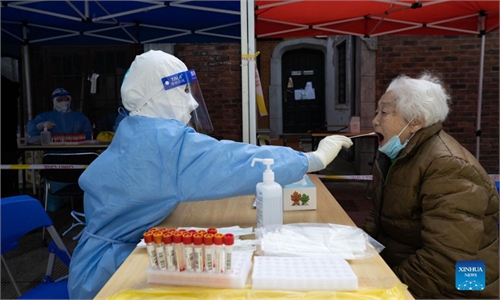Several Chinese cities put under 'static management' against COVID-19 to 'minimize social, economic impact'

Residents receive COVID-19 nulecic acid test in Shanghai on April 4. Photo: VCG
At least nine Chinese cities, counties have been put under static management against COVID-19 this month. But unlike city lockdowns that cause massive standstills of work and life, the measures are specified and targeted at different local situations, trying to minimize the impact on people's daily activities.
On Sunday, the main city of Wuhu, East China's Anhui Province, temporarily implemented static management and launched nucleic acid testing for all residents in the city after one positive case was found on Saturday.
Shanghai's Pudong and Jiading districts also issued notices on Friday and Saturday respectively to adopt the prevention and control measures of "static management of the whole region and nucleic acid testing of all personnel."
Also, cities and counties in Northwest China's Qinghai Province, Northwest China's Shaanxi Province, and East China's Jiangsu Province have issued the similar notice against the Omicron in recent days.
Under the static management, all social gatherings will be cancelled except those to ensure the livelihood of citizens and the basic operation of the city.
Some other cities across China have tightened control on group events and movement to fight COVID-19 flare-up since April.
For example, Suzhou in Jiangsu closed entertainment places like cinemas, gyms and bars, canceled group gatherings, and recommended that people work at home from Saturday, when 39 asymptomatic cases were reported on the day.
But unlike total lockdowns, in Suzhou, those who have to work at their workplaces are allowed to leave their homes and enter their company premises with COVID-19 test results taken within 24 hours, valid passes and health codes.
An entrance guard of Suzhou Capsugel told the Global Times on Sunday that many of the company's employees are working at home and those who need to come to the company must present COVID-19 negative test results within 24 hours before going into the workplace.
According to the control measures Suzhou released on Saturday, residents can still take taxis, subways and buses after temperature checks and 24-hour COVID-19 test results. People can leave the city with nucleic acid test results taken within 24 hours if they really need to.
Similarly, Xi'an, Shaanxi Province clarified that the temporary restrictions on social activities effective from Saturday to next Tuesday are not equivalent to a lockdown, given citizens' concerns over the measures, after the city reported a total of 46 local positive cases from April 2 to April 16.
Local officials said on Saturday that the temporary restrictions don't refer to bans on leaving residential compounds, shutting down all kinds of places or stopping the whole city, given citizens' concerns. The four-day control measures are meant to reduce personnel mobility and cut off Omicron transmission with the smallest effect on normal work and life.
Residents can enter and leave their communities for work. Public transportation is still running. Supermarkets, convenience stores, farmers' markets, medical institutions and retail pharmacies are open as well, except for the suspension of eat-in service at restaurants, where customers can order through take-away service, they said.
A staffer surnamed Zhang from the Xi'an branch of Qinnong Bank told the Global Times on Sunday that he hasn't felt his life is "actually affected" by the restrictions so far.
With proof of nucleic acid testing, Zhang said he can still go to work, take buses, go to shops and see a doctor at the hospital.
"Although many people rushed to supermarkets for food on the night before the restrictions came into effect on Saturday, shops and supermarkets have plenty of daily necessities right now and you can buy them anytime you want," Zhang added.
Other cities like Sanya, South China's Hainan Province and those in Central China's Hubei Province asked citizens to avoid unnecessary trips in and out of local areas, but both allowed for necessary movement with COVID-19 test results.
Anshan, Northeast China's Liaoning Province suspended sports, culture and living service facilities but left supermarkets and malls open.
Wang Guangfa, a respiratory expert at Peking University First Hospital, told the Global Times on Sunday that the targeted and specific anti-epidemic measures adopted by different places in accordance with their local situations reflect China's precise and differentiated anti-COVID-19 strategy, which aims to control the epidemic with the minimum social and economic costs.


